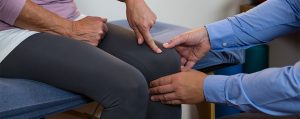5 Ways to Succeed in Physical or Occupational Therapy
Your time is exceedingly valuable. When you are hurt, injured, or sick, you do not want to be sidelined for longer than necessary. Here at Athletico Physical Therapy, we are here to coach you to a better you. Check out the list below on how to make the most out of your physical therapy visits. This list can help you get strong, happy, and healthy during your time in physical therapy.
The Pros and Cons of CrossFit Workouts
Continuing the series focused on fitness and different types of exercise, I want to take a popular workout method, Crossfit, and go through some of the potential pros and cons of the sport. I am a physical therapist and someone who loves training with a barbell, so anytime I can help someone get into that type of training, even if it’s not my preferred method, I am thrilled. I view fitness and training as all-inclusive, where everyone is welcome and can do what makes them happy.
5 Exercises to Improve Core Strength for Cheer Stunting
The core is the foundation for your entire body. Your core is much more than just abdominal muscles; the core includes the whole trunk, including the front, back, sides, and pelvic floor, and it spans from your shoulder blades to your hips. Every movement for a cheerleader starts at the core. If cheerleaders are not activating the core, then all movements, including running, squatting, basket tosses, and stunting, could be weaker, slower, or lead to injury.
Tips from a PT: Building Muscular Strength
Building strength and muscle mass is a goal that many have (and these two attributes will typically go hand-in-hand), whether the person wants to be healthier, look better, help improve athletic performance, etc. These people all have similar goals of improving as much as they can. With new information about the importance of muscle mass and strength for overall health, starting your strength and muscle gain journey as soon as possible is of high importance. But where to begin? How do you navigate the process? There are so many resources on muscle gain and strength building, and it is easy to get lost in the noise. This blog will lay out tips to help you along this journey and give you a framework to draw a plan.
Tips from a PT: How to Perfect the Squat
Squats are a foundational exercise movement. When you squat, you move at multiple joints via the action of several major muscle groups. A squat involves a hip hinge and bending at the knee and ankle. A squat is also a functional movement. Every time you sit down in a chair or get up from a seated position, you move through a squat pattern. Despite the familiarity of this movement pattern, it is easy to make errors with your squat form. So here are some tips to help you squat better (and maybe even with less pain or less risk of injury).
4 Reasons Why I Love Being a Physical Therapist
I decided to become a physical therapist a long time ago when I shadowed a local physical therapist for a week. During that week, I was able to see the wide variety of patients he was able to help and guide through their recovery. He saw young and old, athletic and deconditioned, and confident and anxious. This was when I realized the tremendous impact a physical therapist can have on a patient’s life. From there, I fully committed to becoming a physical therapist, and now I’m well into my sixth year of working as one for Athletico. Being that it’s National Physical Therapy Month, I sat down and reflected on the many reasons why I love my job.
Caregivers: Your Guide to Fall Prevention
Choosing to become a caregiver for a loved one or friend is a kindhearted act. Deciding to provide personal care for someone takes patience and attentiveness. Grocery shopping, housework, cooking, and managing services are typical duties of a caregiver. Along with day-to-day assistance, creating a safe environment is very important to minimize injury to yourself and others.
Strength Training Considerations for Youth Athletes
As young kids’ participation in sports increases, strength training in youth athletes also continues to be seen more frequently. Strength is an important part of daily life as well as for participation in sports. Strength training at a young age can be beneficial for coordination, flexibility, and bone density as well as general health. We know that preventative exercise (prehabilitation) focuses on strengthening muscle groups that are overused in specific sports (i.e. rotator cuff for overhead throwing athletes) and it may reduce overuse injuries in these athletes. Increasing incidence of strength training may lead to questions about safety and how much training children should be doing for their age and level.
